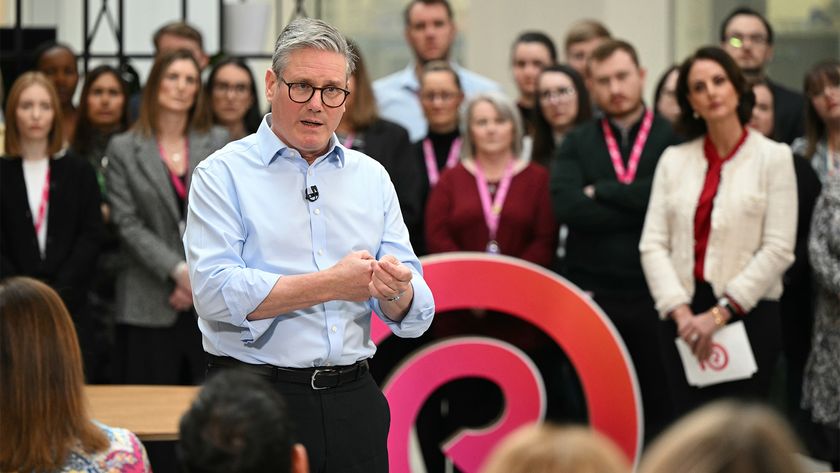Why tech won't ease Whitehall's £20bn budget cuts pain
Government mindset around technology must change, but GaaP won't create substantial savings 'for years'

Technology transformation may not help Whitehall mitigate the devastation of cutting 20 billion from departments' budgets, because initiatives will take too long to bear fruit, it has been claimed.
Chancellor George Osborne yesterday told government departments they must find savings of between 25 per cent and 40 per cent of their budgets by 2019-20.
The Spending Review applies to all departments except those with ringfenced budgets for health, schools, defence and overseas aid.
Technology industry trade body techUK told IT Pro the sheer scale of the cuts required means Whitehall must consider new ways to deliver public services, and that technology like Government-as-a-Platform (GaaP) could help achieve this.
Naureen Khan, associate director of central government at techUK, said: "Government will need to look at new delivery models that can help it to work more efficiently and deliver better public services for less.
"The challenge remains around how government modernises its ageing infrastructure and transitions to new business models which will fundamentally change the way departments work.
"The Government Digital Service (GDS) has played a key role in the progress made to date. To meet the government's ambition, it's vital that GaaP is successfully implemented and effective engagement with industry will be important to achieving this."
Get the ITPro. daily newsletter
Sign up today and you will receive a free copy of our Focus Report 2025 - the leading guidance on AI, cybersecurity and other IT challenges as per 700+ senior executives
GaaP was touted by the Cabinet Office in February as a way to replace expensive legacy contracts with component-based, standardised infrastructure that could be replicated across departments.
Such customised IT systems could reduce government's reliance on outsourcers and eliminate costly duplicated projects, and the GDS is working on three prototypes, including an Amazon-like payments platform.
But existing identity assurance platform Gov.uk Verify, one of the first examples of GaaP, encountered a string of problems along the way to its public beta status, including thousands of people missing out on a marriage tax break because they were asked to provide documents many people did not actually have.
Kable analyst Jessica Figueras told IT Pro these problems mean GaaP is unlikely to take much of the burden of the cuts from departments in the near future.
"The savings that those platforms tend to provide will take a long time to come through," she said.
"Verify as an example, it took a long time to build it and get it working, then you don't have the whole government switching overnight. It might well be that they're not in a position to use the service. There's a huge amount of lag."
The GDS received 55 million in the latest Budget to use technology to drive further efficiencies in central government and fund proposals for new digital projects.
A change of mindset
But analyst group TechMarketView believes that while GaaP can deliver some effiency savings, there are fewer substantial savings to be found after the last government phased out many expensive legacy contracts.
"It is our opinion that the low hanging fruit has been picked," said analyst Georgina O'Toole in her new report After the election: The next five years.
"In particular, contract cancellations, supplier renegotiations and procurement rationalisation could only be taken so far," she said
The Cabinet Office expects Whitehall to be rid of legacy IT contracts by 2020, and many of these deals were replaced between 2010 and 2015, or are soon set to expire, leaving a leaner government with less fat to trim.
Instead, O'Toole argued the government must focus on full-scale reform of the civil service instead, to change the way staff see IT.
"It should not be seen as purely a cost to cut'," she said. "The focus must also be on ICT as an enabler of civil service reform: investing in ICT to save money from the broader budget and viewing ICT in terms of the value it can bring to public services."
Supporting this, a techUK survey of 929 civil servants this year found only 20 per cent believed their department has the skills and capabilities to manage suppliers.
As a result, the body recommended Whitehall develops a better culture to have staff skilled in technology, as well as using technology to deliver better public services.
TechMarketView believes more innovation and transformation will come from the Cabinet Office working with departments to create a mentality of experimentation, where departments are more open to trying new things, even if it means occasionally failing.
Under this model, data will become key and if it becomes widely accepted, GaaP could help break up data silos by introducing common platforms, rather than every department using their own separated systems.
There are already signs of the government recognising the importance of data, with GDS chief Mike Bracken appointed its very first chief data officer in March.
Right-wing think tank, Policy Exchange, has called for Whitehall to go further by creating an Office of Data Responsibility to improve people's attitudes to government use of personal data.
But how quickly such wide scale reform and changing of mindsets can happen is unclear, and it is unlikely they will take much of the burden off departments that are faced with slashing 40 per cent of their budgets.
"You are talking about huge structural changes, hiving off huge areas of government [because of the Spending Review]," said Figueras.
"The issue people forget is the transition costs. You can't switch from model A to model B overnight, and in order to have continuity of service these things take a really long time."

















